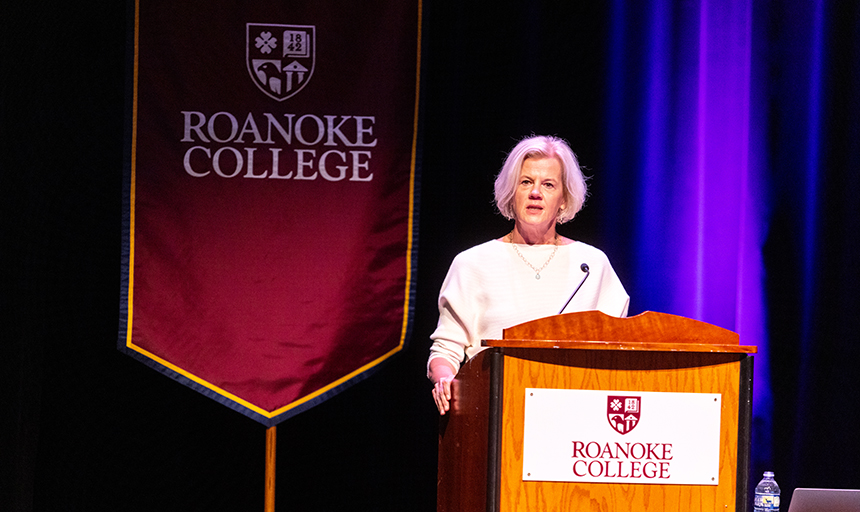Bestselling author Beth Macy shares glimmer of hope in opioid crisis
March 18, 2024
Category: Campus

Roanoke College recently welcomed bestselling local author Beth Macy, who spoke to a nearly full house in Olin Theater as part of a lecture series sponsored by the James C. and S. Maynard Turk Pre-Law Program.
In Macy’s third appearance at Roanoke College, she focused on the topic of her latest book, “Raising Lazarus: Hope, Justice, and the Future of America’s Overdose Crisis,” a follow-up to her bestselling book “Dopesick,” which was adapted into a Peabody- and Emmy Award-winning Hulu series of the same name.
While “Dopesick” explored the genesis of America’s opioid addiction crisis and its impact, particularly on small and economically distressed communities, “Raising Lazarus” follows the everyday heroes who are fighting – often on their own time and their own dime – to serve those most affected by the epidemic. On Tuesday, Macy focused heavily on those personal stories, which are at once heartbreaking and inspiring.
“The opioid crisis is festering and growing,” she said. “It’s taking advantage of longstanding fissures in American society, of a nation that sent a lot of jobs away but did very little for people left behind, of a country that doesn’t offer universal health care and of the fundamental philosophical differences between treating people like a criminal and a moral failure – and treating them like a human being with a treatable medical condition.”
Macy’s talk was peppered with troubling statistics about the crisis, which continues to worsen. Some 112,000 people suffered fatal overdoses last year, which doesn’t count those impacted by related conditions, such as Hepatitis C, HIV or suicide. It also doesn’t calculate the effect on family and friends of the victims. She later added that if you tally the deaths since Oxycontin was introduced on the market in 1996, it comes to more than a million lives lost.
“We lose a person every four-and-a-half minutes,” she said. “Twenty people will die before we leave each other tonight.”
Despite those staggering figures, Macy said, the country still has not caught up with evidence-based practices. Most rehabilitation centers don’t offer medication-assisted treatment (MAT) for opioid use disorder despite solid evidence that drugs like buprenorphine and methadone can save lives. Macy likened MAT to needle exchanges, which generally draw opposition within communities but are proven to reduce the spread of disease and greatly increase the likelihood that people will enter treatment.
Those individuals on the front lines of the crisis, whom one of Macy’s sources calls “rowdy angels,” include recovering users, mothers who have lost children, public health officials, emergency doctors and judges. They include folks who ferry users back and forth to treatment, search homeless encampments for those who have fallen off the map, set up ministries to provide clean needles and other support, or erect cardboard cemeteries on courthouse lawns to prove an unsettling point.
Macy mentioned some specific hometown heroes from the Roanoke Valley, including Dr. John Burton, chair of emergency medicine at Carilion Clinic, who has become an advocate for MAT. She also gave a shout-out to Chief U.S. District Judge Michael Urbanski, who was in the audience. Urbanski set up a federal recovery treatment court in Roanoke that is diverting a large percentage of its participants from relapse.
As her lecture concluded, Macy urged people in the audience to help spread the word about opioid addiction and the pathways to care that can potentially rebuild broken lives.
“If you know judges or prosecutors or doctors, tell them these stories. I really want people to know this information,” she said. “You don’t have to wait until you are personally affected before you care about this issue.”